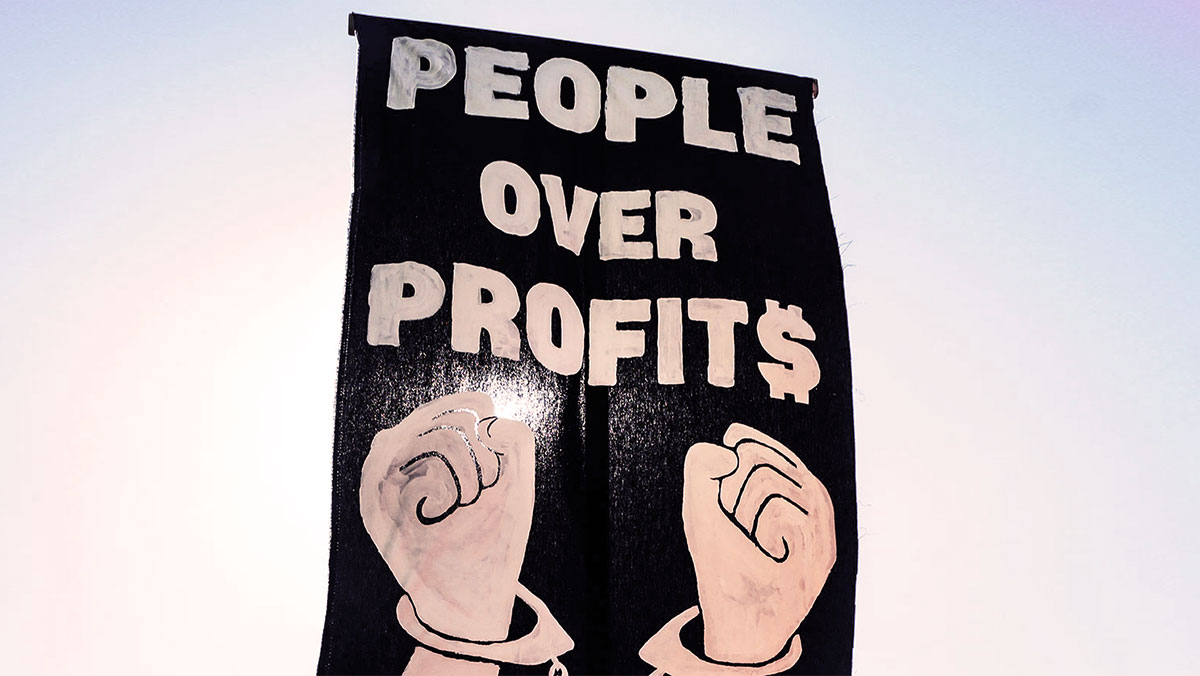
Marketers have an uncanny ability to redefine words and frame situations in their favor. The current global situation is no different. I’ve received a flurry of emails over the last week, aimed at convincing me that buying products I don’t need is an act of “solidarity” and “being in this together.” I wish I was more surprised. The relationship between crisis and opportunism is as old as time, but we should demand better.

Image source: Tan Liu (@theponzifactor)
A virus, by nature, attacks and capitalizes on weakness. We are seeing weakness in our government, public policy, healthcare systems, and consumerism. Why would brands not also be exposed? After all, we’re in this together, aren’t we? When celebrities respond by posting sing-along videos why wouldn’t your favorite brand assume that offering a discount is akin to helping out? Their true underlying values and raison d’etre are being exposed by the hour and the actions of these celebrities, companies, and brands during this crisis will not be forgotten after the pandemic.
“To question the doing-well-by-doing-good-globalists is not to doubt their intentions or results, rather it is to say that even when all those things are factored in, something is not quite right in believing they are the ones best positioned to effect meaningful change.”
― Anand Giridharadas
I’m sure you’ve seen at least a handful of “togetherness sales” and “solidary sales.” For many brands, the definition of “being in this together” has always referred to the intersection of their product or service and your money. The strategy of a lifestyle brand is — essentially — to convince you to define the value of your life with their brand. While many would argue this definition in crass, I hold that a pandemic is no time for mincing words. Now, in the face of a global crisis, these same lifestyle brands are choosing to pivot that strategy by inauthentically adopting the character and tone of a caregiver archetype.
The strategy is to create a perception of solidarity. But it’s hollow when your platform is a coupon for 15% off silk blouses or a discounted ticket for a cruise ship under quarantine. In order to truly be a caregiver brand, you need to care more about helping your customers move through this crisis than moving your dead stock. Empathy and compassion must permeate your every action. And you had to start yesterday, not tomorrow. If you aren’t offering meaningful and relevant information and solutions, then you are distracting from true solidarity.
Attempting to co-op solidarity is criminal. Solidarity is not a sales pitch. It is a battle cry, an ethos, and a bond between working people everywhere to band together against the hierarchical systems that seek to exploit them. Solidarity is about bolstering each other up in the face of maltreatment and persecution. It means locking arms in service of one another, not for a lifestyle brand. Companies and employers have no claim on solidarity, it belongs to workers who have spent the last 100+ years fighting, bleeding, and dying for it. Don’t disrespect the people, or the lasting severity of this pandemic by trying on language that is in direct conflict with your brand’s true interest.
“It is we who plowed the prairies,
Built the cities where they trade,
Dug the mines and built the workshops,
Endless miles of railroad laid,
Now we stand outcast and starving,
Mid the wonders we have made,
But the union makes us strong.
Solidarity forever.”
— Ralph Chaplin
In a world where cause marketing — the act of investing in social good for the purpose of advertising — is a regular extension of every marketing plan, and altruistic capitalism is the go-to move for billionaire PR spins, why should we expect a crisis to bring out better behavior in brands? We probably don’t, but we should.
Now is not the time to badger your email lists and social media followers with veiled offers and coupon drives. It is the time to offer real value to your customers, many of which lost jobs and are staring down the barrel of 6-8 weeks without pay, if not longer.
“Aim above morality. Be not simply good, be good for something.” — Henry David Thoreau
Everyone is going to take a hit, but maybe your brand could take that hit in a way that is actually useful. Instead of marking your non-essential products down 15%, you could donate to food banks, hand out hygienic gift bags, provide supplies to medical personnel, and offer materials or your manufacturing capabilities to produce the much-needed medical equipment. Invest in solutions and discount products that are actually useful for home quarantine and cleanliness efforts.
Stay at home but get involved with the people and cultures that make your business possible, rather than just pandering to it. With the ongoing school closures, streaming services could offer kids content for free. Fast-food restaurants could offer their entire menu as 2 for 1 drive-through-only. Grocery stores could find ways to offer free delivery or curbside pickup. Everyone else could hire at least a couple of laid-off workers to work remotely.
Solidarity will never belong to a brand. It belongs to the people, and those people really need help.
Image source: Elizabeth Lekas